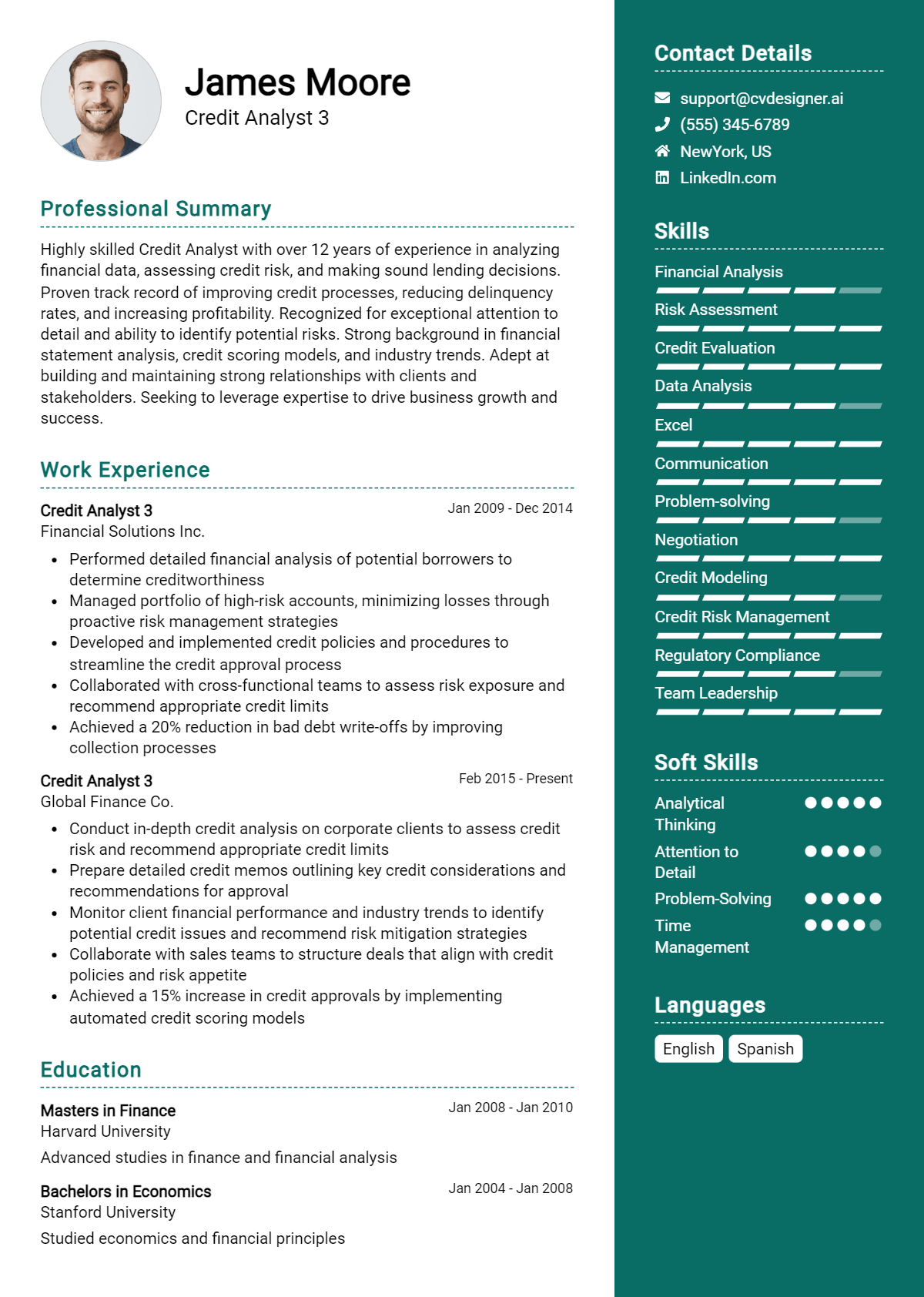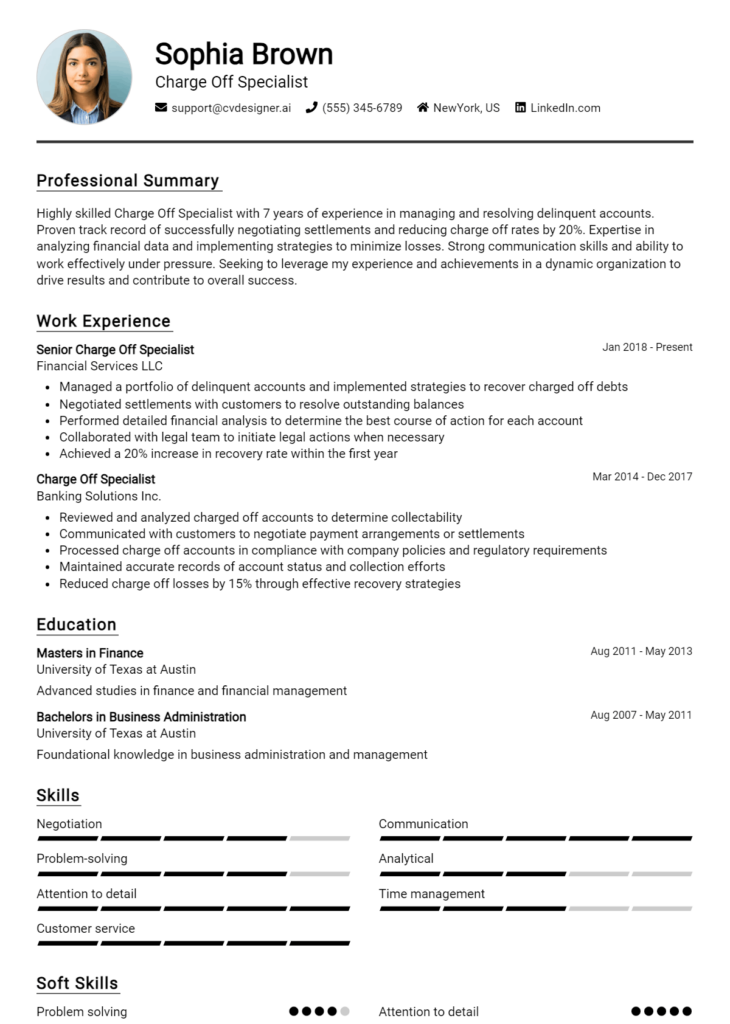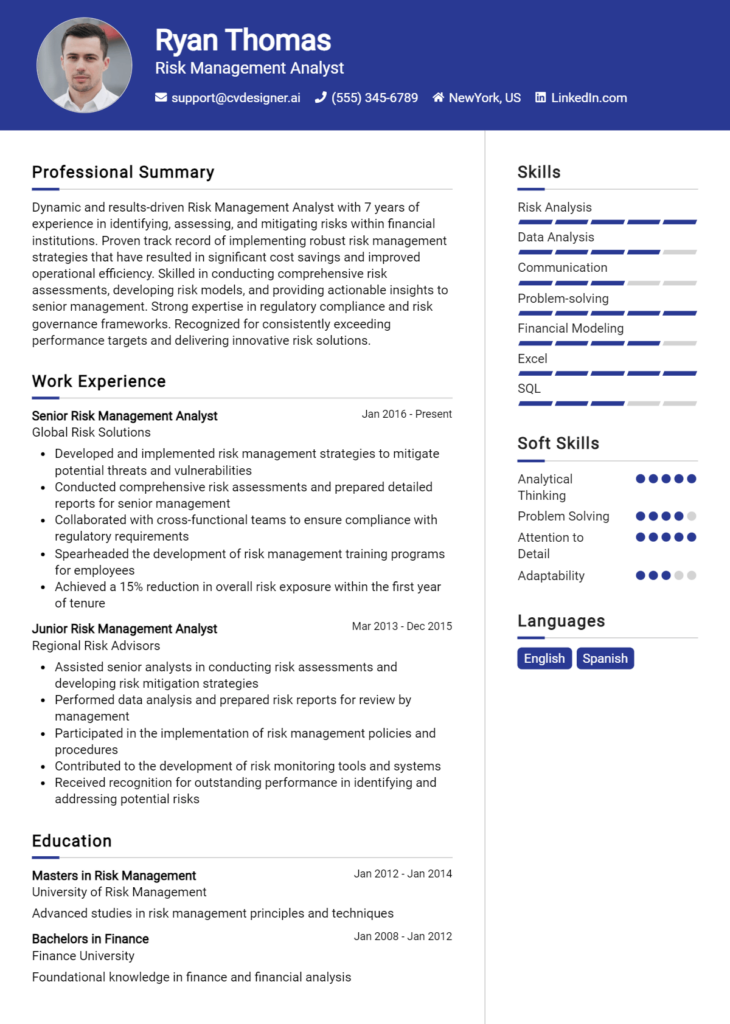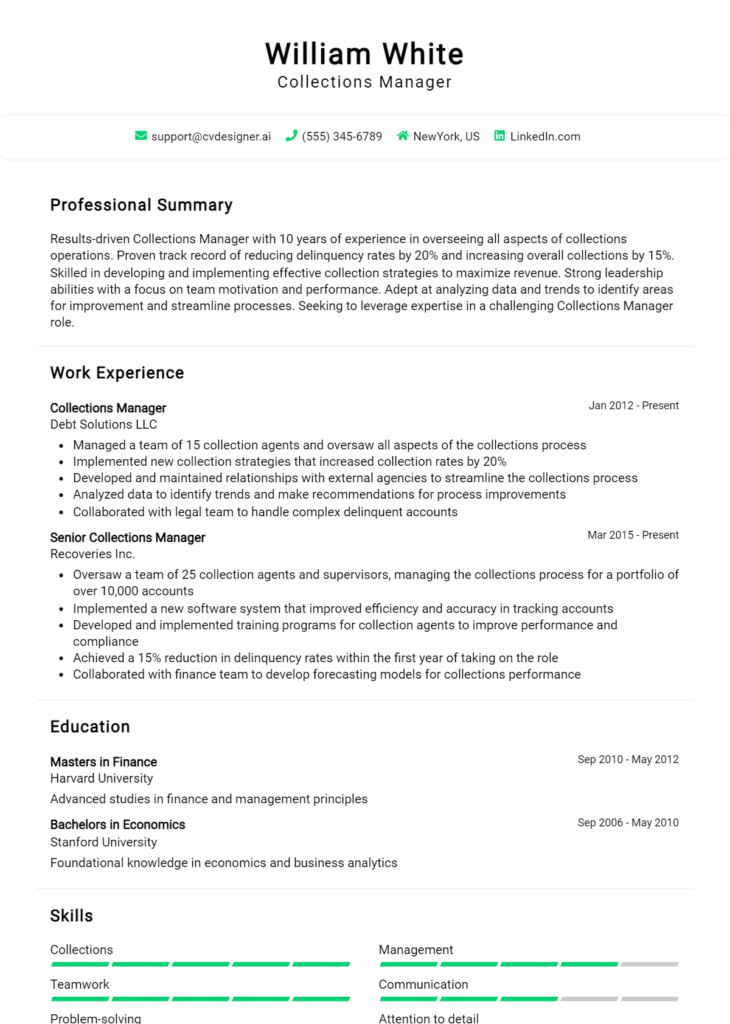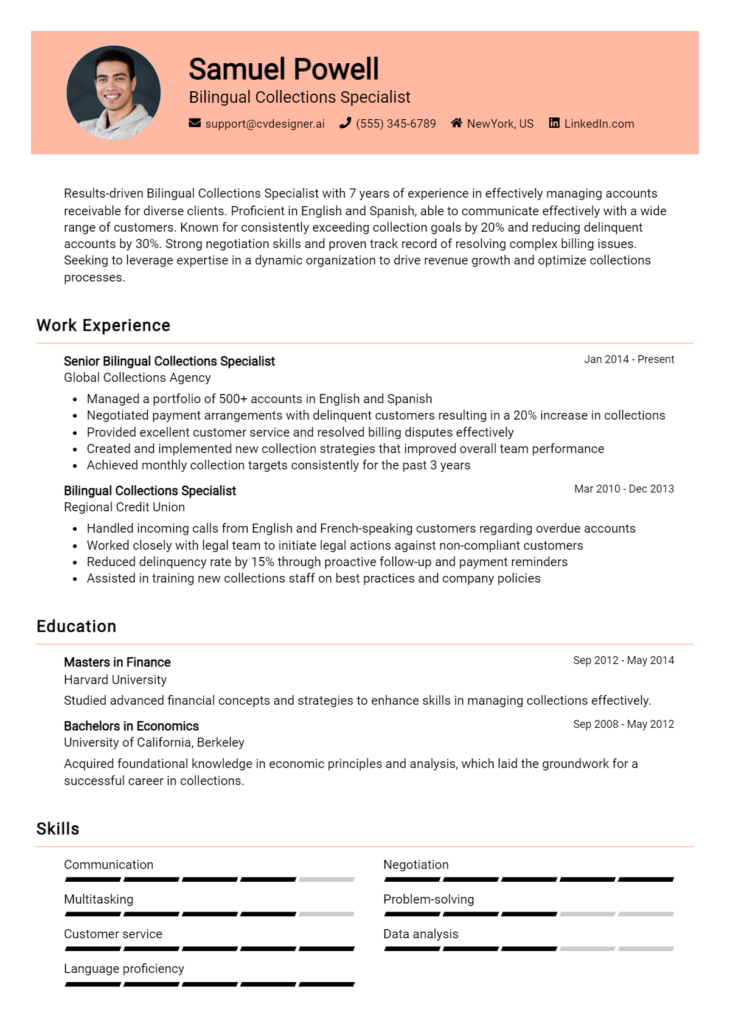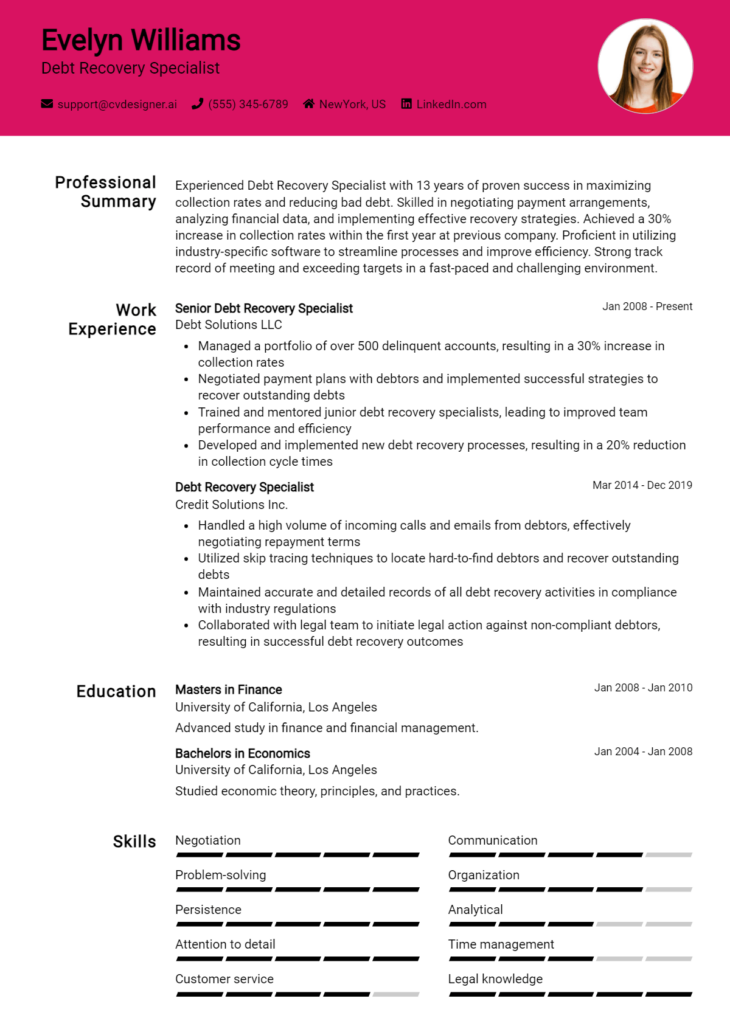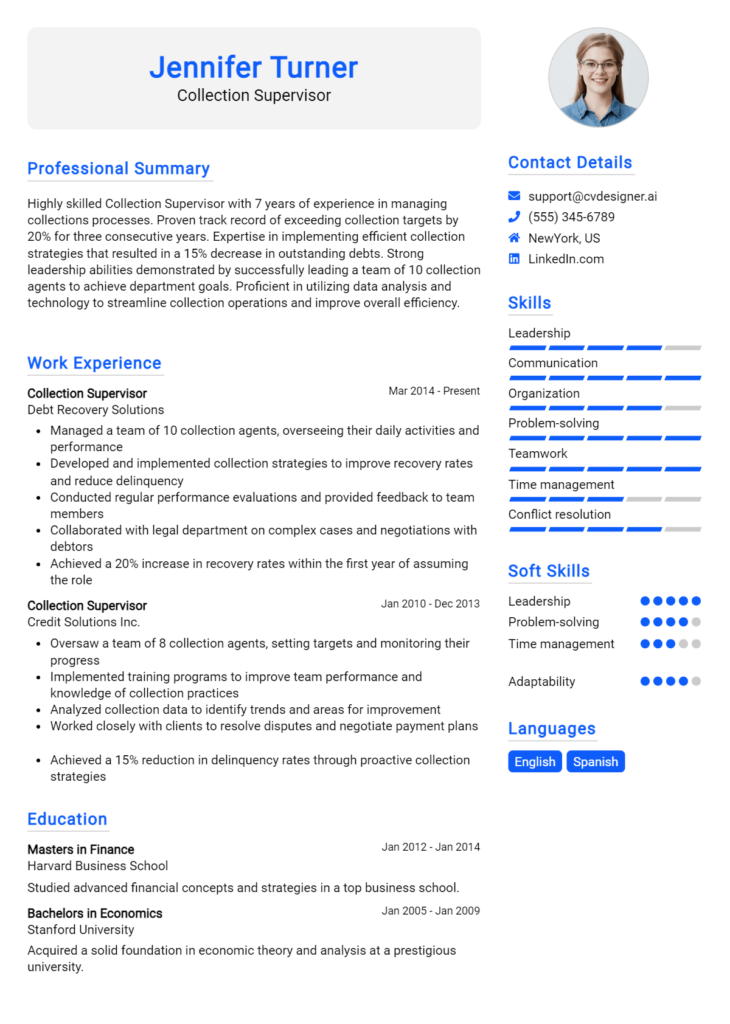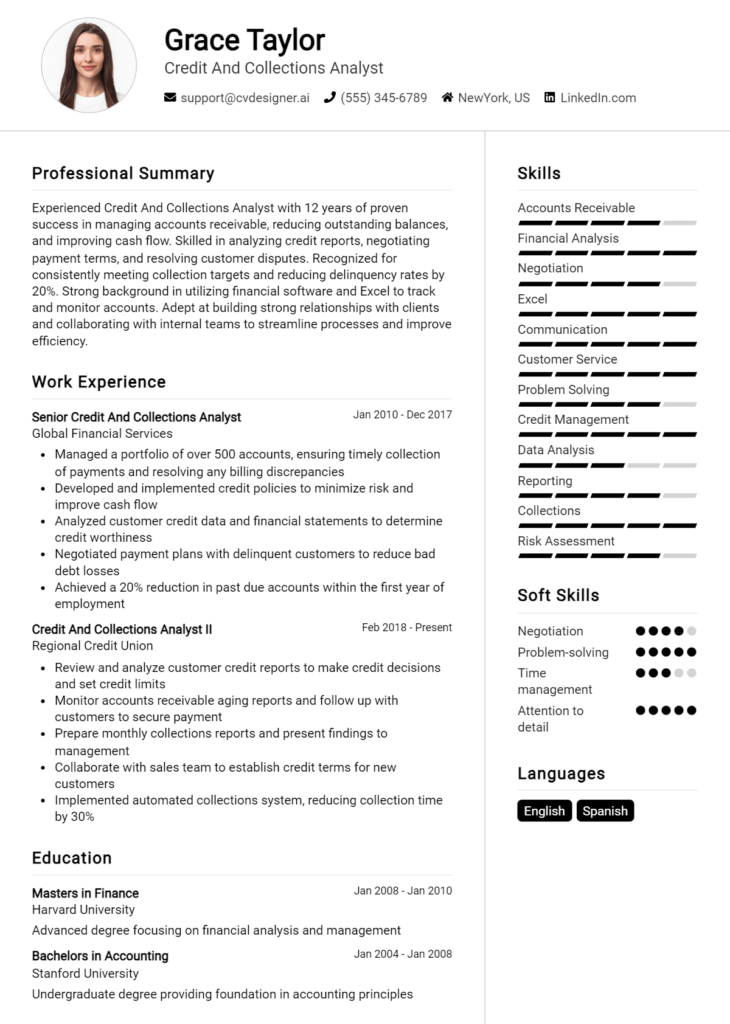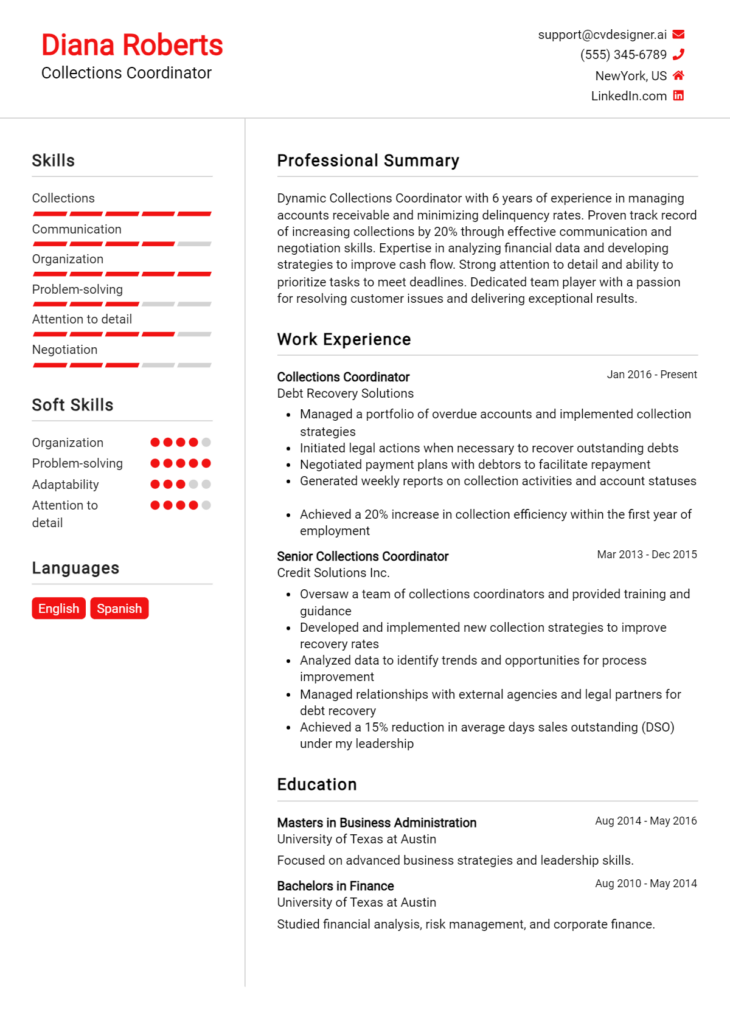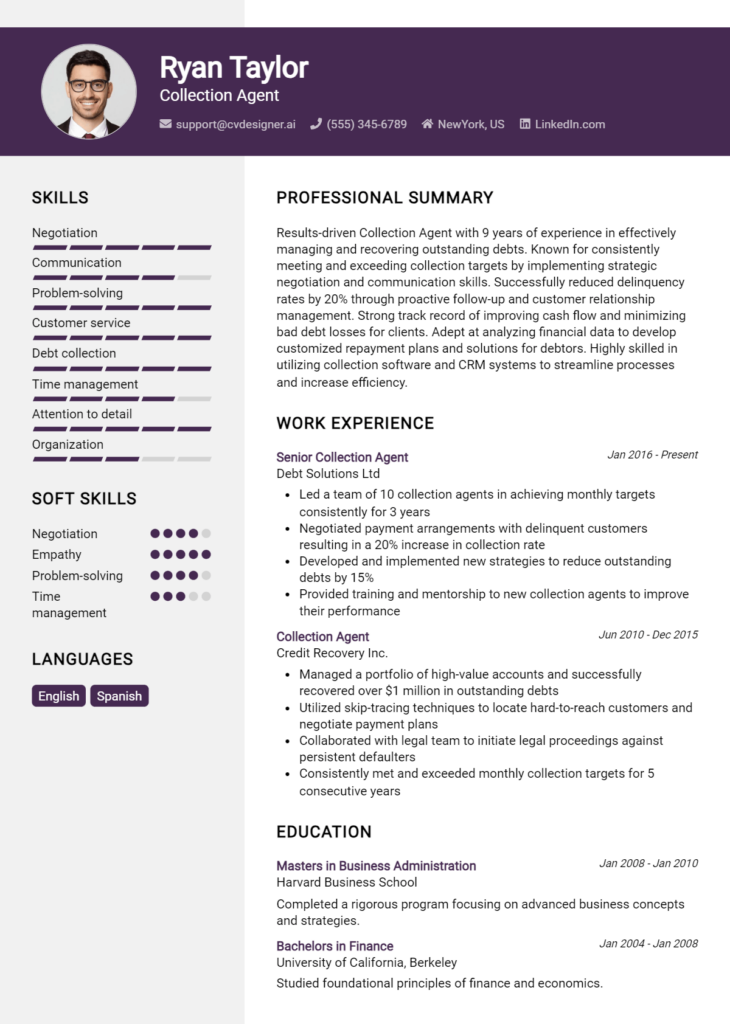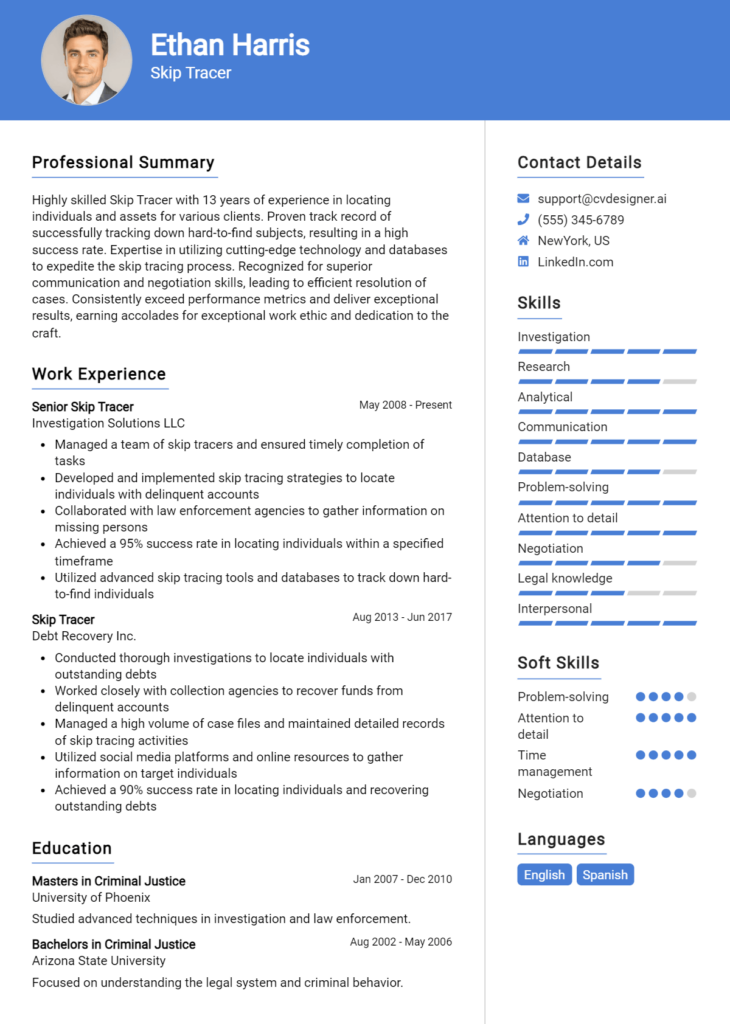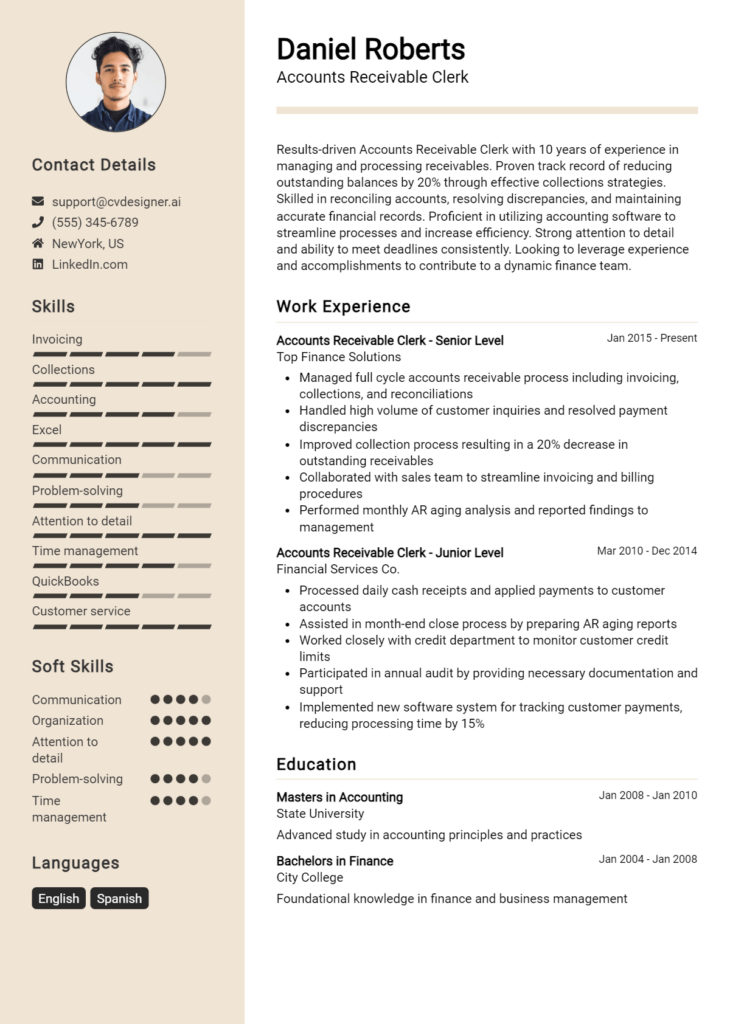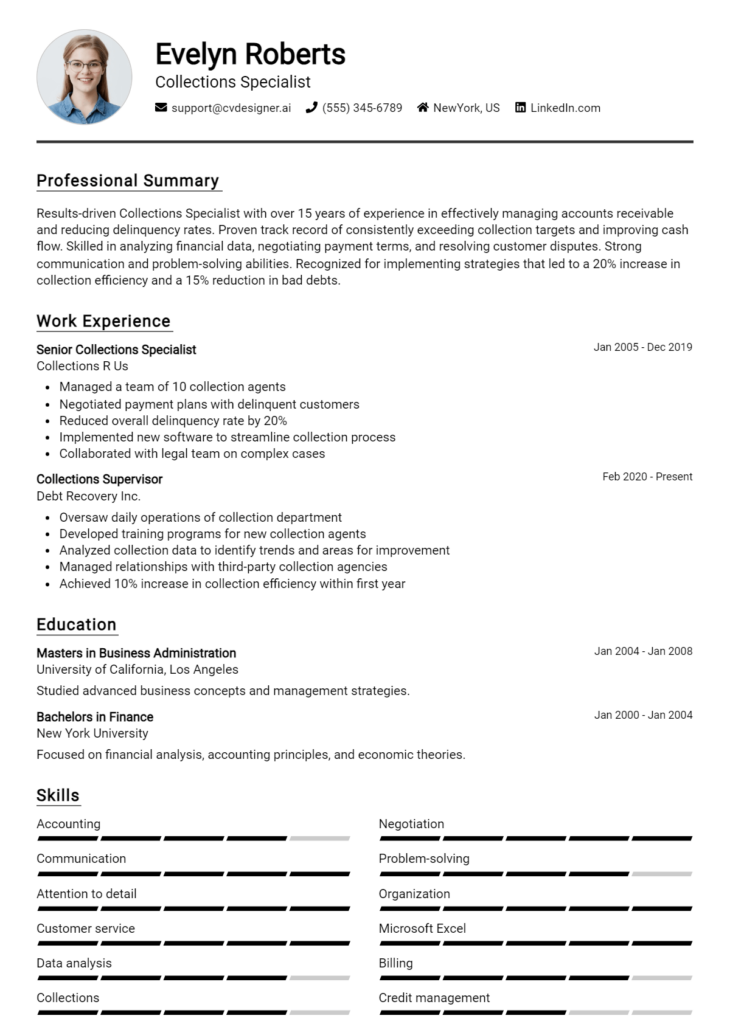Credit Analyst Core Responsibilities
A Credit Analyst plays a pivotal role in assessing the creditworthiness of individuals and organizations, requiring a blend of technical, operational, and problem-solving skills. This position involves analyzing financial data, preparing reports, and collaborating with various departments such as finance, sales, and risk management to ensure informed lending decisions. The ability to interpret complex data and communicate findings is essential, as these skills directly contribute to the organization's financial health and risk mitigation strategies. A well-structured resume can effectively highlight these qualifications, demonstrating a candidate's readiness to support the company's goals.
Common Responsibilities Listed on Credit Analyst Resume
- Evaluate credit data and financial statements to determine the risk of lending.
- Prepare detailed credit reports and present findings to stakeholders.
- Analyze market trends and economic conditions affecting credit risk.
- Collaborate with loan officers and sales teams to assess client credit needs.
- Monitor existing loans and assess repayment risk over time.
- Conduct financial modeling and forecasting to support credit decisions.
- Review and recommend changes to credit policies and procedures.
- Assist in the development of credit risk assessment tools and methodologies.
- Maintain client relationships and provide ongoing credit support.
- Ensure compliance with regulatory guidelines and internal controls.
- Utilize software and analytical tools to enhance credit assessment processes.
High-Level Resume Tips for Credit Analyst Professionals
In the competitive field of credit analysis, a well-crafted resume serves as a vital tool for standing out among numerous applicants. It often represents the first impression a candidate makes on potential employers, conveying not just qualifications but also professionalism and attention to detail. For Credit Analyst professionals, this document must effectively reflect both skills and achievements relevant to the role, showcasing analytical prowess, industry knowledge, and financial acumen. This guide aims to provide practical and actionable resume tips specifically tailored to help Credit Analyst professionals enhance their resumes and make a lasting impact in their job search.
Top Resume Tips for Credit Analyst Professionals
- Tailor your resume to the specific job description by incorporating relevant keywords and skills mentioned in the posting.
- Highlight your relevant experience in credit analysis, financial modeling, and risk assessment to demonstrate your expertise.
- Quantify your achievements where possible, such as indicating the percentage of risk reduction or increase in efficiency you contributed to in previous roles.
- Showcase industry-specific skills, such as knowledge of credit scoring models, financial regulations, and economic indicators.
- Include any certifications relevant to credit analysis, such as CFA or FRM, to bolster your qualifications.
- Utilize a clear and professional format that enhances readability and ensures your most important information stands out.
- Incorporate strong action verbs to describe your responsibilities and achievements, such as 'analyzed', 'evaluated', and 'developed'.
- Focus on results-oriented statements that show how your contributions benefited previous employers.
- Maintain a concise overview of your professional summary to capture the attention of hiring managers quickly.
- Proofread your resume multiple times to avoid any grammatical errors or typos, as these can detract from your professionalism.
By implementing these tips, Credit Analyst professionals can significantly increase their chances of landing a job in this competitive field. A polished and targeted resume not only highlights relevant skills and experiences but also demonstrates a commitment to the profession, making a compelling case for why a candidate deserves a closer look from potential employers.
Why Resume Headlines & Titles are Important for Credit Analyst
In the competitive field of credit analysis, a well-crafted resume headline or title plays a crucial role in capturing the attention of hiring managers. A strong headline serves as a concise summary of a candidate's key qualifications and sets the tone for the rest of the resume. It provides a snapshot of the candidate's expertise, making it easier for hiring managers to quickly assess their fit for the role. An impactful headline should be relevant to the position being applied for, ensuring that it resonates with the specific requirements of the job while highlighting the candidate's unique value proposition.
Best Practices for Crafting Resume Headlines for Credit Analyst
- Use concise language that clearly conveys your role and expertise.
- Incorporate relevant keywords from the job description to align with the employer's needs.
- Highlight your most significant accomplishments or skills in your headline.
- Avoid jargon or overly technical terms that may confuse the reader.
- Make sure it reflects your experience level, whether entry-level, mid-career, or senior.
- Stay focused on your specific role as a credit analyst and avoid general titles.
- Keep the headline to one impactful phrase or sentence for easy readability.
- Tailor the headline for each job application to match the specific role you are applying for.
Example Resume Headlines for Credit Analyst
Strong Resume Headlines
Results-Driven Credit Analyst with 5+ Years of Experience in Risk Assessment and Financial Analysis
Detail-Oriented Credit Analyst Specializing in Credit Scoring and Portfolio Management
Experienced Credit Analyst with Proven Track Record in Improving Credit Policies and Reducing Default Rates
Weak Resume Headlines
Credit Analyst
Finance Professional Seeking Opportunities
Strong headlines are effective because they immediately communicate the candidate's expertise and relevance to the position, showcasing their accomplishments and skills in a way that grabs attention. They are specific and tailored, making it easy for hiring managers to recognize the candidate's potential fit. In contrast, weak headlines fail to impress because they are vague and generic, lacking the detail necessary to differentiate the candidate from others. Such headlines do not provide any insight into the candidate's capabilities or value, making them easily forgettable in a sea of applications.
Writing an Exceptional Credit Analyst Resume Summary
A well-crafted resume summary is essential for a Credit Analyst as it serves as the first impression for hiring managers. This brief yet impactful statement quickly captures attention by highlighting key skills, relevant experience, and notable accomplishments that align with the job description. A strong summary not only conveys the candidate's qualifications but also sets the tone for the entire resume. It should be concise and tailored specifically to the position being applied for, ensuring that it resonates with the employer's needs and expectations.
Best Practices for Writing a Credit Analyst Resume Summary
- Quantify Achievements: Use numbers to demonstrate the impact of your work, such as improvements in credit scores or reductions in default rates.
- Highlight Key Skills: Focus on the most relevant skills for a Credit Analyst, including financial analysis, risk assessment, and data interpretation.
- Tailor for the Job Description: Customize your summary to reflect the specific requirements and responsibilities mentioned in the job listing.
- Use Industry Terminology: Incorporate relevant jargon and phrases that are common in the finance and credit industry to showcase your expertise.
- Keep it Concise: Aim for 3-5 sentences that clearly convey your qualifications without unnecessary fluff.
- Showcase Relevant Experience: Mention previous roles or experiences that directly relate to the responsibilities of a Credit Analyst.
- Emphasize Problem-Solving Skills: Highlight your ability to analyze data and make informed decisions that positively impact the organization.
- Include Certifications: If applicable, mention any relevant certifications (e.g., CFA, CFI) that enhance your credibility as a Credit Analyst.
Example Credit Analyst Resume Summaries
Strong Resume Summaries
Results-driven Credit Analyst with over 5 years of experience in analyzing credit data and financial statements to assess risks. Successfully reduced loan default rates by 20% through rigorous credit analysis and effective risk management strategies.
Detail-oriented Credit Analyst adept at utilizing advanced financial modeling techniques to support lending decisions. Proven ability to increase portfolio profitability by 15% through strategic credit assessments and risk evaluation.
Dynamic Credit Analyst with a track record of improving credit scoring processes, leading to a 30% increase in approved loan applications. Skilled in utilizing data analytics tools to identify trends and enhance decision-making.
Weak Resume Summaries
Credit Analyst with experience in finance looking for new opportunities. Good at analyzing data.
Detail-oriented professional seeking a Credit Analyst position. I have some experience in credit analysis.
The strong resume summaries are considered effective because they provide specific, quantifiable achievements that demonstrate the candidate’s impact in previous roles. They clearly articulate relevant skills and experiences tailored to the position. In contrast, the weak summaries lack detail and specificity, making them vague and unmemorable. They fail to showcase the candidate's qualifications or their potential contributions to the employer, ultimately diminishing their appeal to hiring managers.
Work Experience Section for Credit Analyst Resume
The work experience section of a Credit Analyst resume is pivotal in demonstrating the candidate's technical competencies, leadership capabilities, and commitment to delivering high-quality financial products. This section not only highlights the applicant's proficiency in analyzing credit data and assessing risk but also illustrates their ability to manage teams effectively and collaborate with various stakeholders. By quantifying achievements and aligning experiences with industry standards, candidates can present a compelling narrative that showcases their value to potential employers.
Best Practices for Credit Analyst Work Experience
- Highlight specific technical skills relevant to credit analysis, such as financial modeling and risk assessment tools.
- Quantify achievements with concrete data, such as percentage improvements in credit risk assessment accuracy.
- Emphasize collaborative projects, detailing how teamwork contributed to successful outcomes.
- Use industry-standard terminology to align your experience with common expectations in the field.
- Focus on results-driven statements that showcase your contributions to projects.
- Tailor your experiences to reflect the requirements of the position you are applying for.
- Include any leadership roles or responsibilities that demonstrate your ability to manage teams effectively.
- Incorporate relevant software and tools that you are proficient in, showcasing your technical expertise.
Example Work Experiences for Credit Analyst
Strong Experiences
- Led a team of analysts in developing a credit scoring model that improved approval rates by 30% while reducing default rates by 15%.
- Implemented a new risk assessment framework that decreased processing time by 25%, enhancing overall operational efficiency.
- Collaborated with cross-functional teams to produce comprehensive credit reports, resulting in a 20% increase in client satisfaction scores.
- Conducted thorough market analysis that identified emerging trends, contributing to a 10% increase in profitable lending opportunities.
Weak Experiences
- Responsible for analyzing credit reports.
- Worked on various financial projects with team members.
- Participated in meetings regarding credit risk.
- Assisted with general data entry tasks.
The examples of strong experiences are considered effective because they are specific, quantifiable, and demonstrate clear results that align with the expectations of a Credit Analyst role. They highlight leadership, collaboration, and technical expertise, showcasing the candidate's ability to deliver significant contributions. Conversely, the weak experiences lack detail and measurable outcomes, presenting vague responsibilities that fail to convey the candidate's impact or skills effectively. This contrast emphasizes the importance of clarity and quantification in crafting a compelling work experience section.
Education and Certifications Section for Credit Analyst Resume
The education and certifications section of a Credit Analyst resume is crucial in establishing the candidate's academic foundation and commitment to professional development. This section highlights not only formal degrees but also industry-relevant certifications and continuous learning efforts, which are vital for staying competitive in the rapidly evolving financial landscape. By detailing relevant coursework, certifications, and specialized training, candidates can significantly enhance their credibility and demonstrate a strong alignment with the requirements of the Credit Analyst role.
Best Practices for Credit Analyst Education and Certifications
- Include relevant degrees such as Finance, Accounting, or Economics to establish foundational knowledge.
- List industry-recognized certifications like Chartered Financial Analyst (CFA) or Certified Credit Professional (CCP) to showcase expertise.
- Highlight specialized training in credit analysis tools and software to reflect technical proficiency.
- Provide a concise description of relevant coursework that directly pertains to credit risk assessment and financial analysis.
- Ensure all listed qualifications are up-to-date and relevant to current industry standards.
- Use clear formatting to make the section easily readable and accessible for hiring managers.
- Consider including honors or special recognitions received during your education that pertain to financial analysis.
- Tailor this section for each job application by emphasizing the most pertinent qualifications for the role.
Example Education and Certifications for Credit Analyst
Strong Examples
- Bachelor of Science in Finance, University of XYZ, Graduated May 2021
- Chartered Financial Analyst (CFA), Level II Candidate, Expected Completion 2024
- Certified Credit Professional (CCP), Issued June 2022
- Relevant Coursework: Advanced Financial Analysis, Risk Management, and Credit Risk Assessment
Weak Examples
- Bachelor of Arts in History, University of ABC, Graduated 2018
- Certification in Basic Computer Skills, Completed 2013
- Online Course in Personal Finance, Completed 2020
- High School Diploma, Graduated 2015
The strong examples listed above are considered effective because they directly relate to the skills and knowledge required for a Credit Analyst position, showcasing relevant degrees and recognized certifications that enhance the candidate's qualifications. In contrast, the weak examples reveal educational qualifications and certifications that lack relevance to the financial analysis field, potentially diminishing the candidate's appeal to hiring managers looking for specialized expertise.
Top Skills & Keywords for Credit Analyst Resume
In today's competitive job market, a standout resume is essential for a Credit Analyst position. Highlighting the right skills can significantly enhance your chances of landing an interview. Employers seek candidates who not only possess a strong analytical mindset but also demonstrate effective communication and problem-solving abilities. By showcasing both hard and soft skills, applicants can present a well-rounded profile that aligns with the demands of the role. Including these skills effectively in your resume can lead to greater opportunities and career advancement in the finance industry. For those interested in crafting a compelling resume, understanding the importance of skills and relevant work experience is crucial.
Top Hard & Soft Skills for Credit Analyst
Soft Skills
- Critical thinking
- Attention to detail
- Communication skills
- Problem-solving
- Time management
- Adaptability
- Teamwork
- Interpersonal skills
- Negotiation skills
- Decision-making
Hard Skills
- Financial analysis
- Credit risk assessment
- Data analysis
- Proficiency in financial modeling
- Knowledge of credit scoring systems
- Familiarity with regulatory standards (e.g., Basel III)
- Expertise in Microsoft Excel and financial software
- Report writing and presentation skills
- Understanding of investment principles
- Ability to use statistical analysis tools
Stand Out with a Winning Credit Analyst Cover Letter
I am writing to express my interest in the Credit Analyst position at [Company Name], as advertised on [Where You Found the Job Posting]. With a strong background in financial analysis and a keen eye for detail, I am excited about the opportunity to contribute to your team by evaluating creditworthiness and supporting informed lending decisions. My experience in analyzing financial statements and credit data, combined with my passion for assisting individuals and businesses in achieving their financial goals, makes me an ideal candidate for this role.
In my previous position at [Previous Company Name], I successfully conducted thorough credit assessments for both individual and corporate clients. I utilized advanced analytical tools and methodologies to evaluate credit risk, prepare detailed reports, and provide actionable insights to management. My ability to synthesize complex financial information and present it in a clear and concise manner has resulted in improved decision-making processes and increased confidence in our lending policies. Furthermore, I developed strong relationships with clients, ensuring transparency and understanding throughout the credit evaluation process.
I am particularly drawn to [Company Name] because of its reputation for fostering innovation and excellence in financial services. I admire your commitment to responsible lending practices and believe that my analytical skills, along with my proactive approach to risk management, align well with your company's values. I am eager to bring my expertise in credit analysis to your team and contribute to [specific project or goal of the company], ultimately helping to drive sustainable growth and profitability.
Thank you for considering my application. I look forward to the opportunity to discuss how my skills and experiences can benefit [Company Name]. I am excited about the possibility of joining your team and contributing to the success of your credit analysis initiatives. Please feel free to contact me at [Your Phone Number] or [Your Email Address] to schedule a conversation.
Common Mistakes to Avoid in a Credit Analyst Resume
When crafting a resume for a Credit Analyst position, it's crucial to present yourself as a competent and detail-oriented candidate. However, many applicants make common mistakes that can hinder their chances of landing an interview. Understanding these pitfalls can help you create a compelling resume that highlights your qualifications and skills effectively.
Neglecting Quantifiable Achievements: Failing to include specific numbers or metrics to demonstrate your impact can make your accomplishments seem vague. Use data to showcase how you've improved processes or contributed to your previous employers' success.
Using Generic Job Descriptions: Relying on cookie-cutter descriptions for past roles can diminish the uniqueness of your experience. Tailor your job descriptions to reflect your specific responsibilities and achievements relevant to the credit analysis field.
Omitting Relevant Skills: Not listing key skills specific to credit analysis, such as risk assessment, financial modeling, or proficiency in financial software, can make your resume less competitive. Ensure you highlight skills that are relevant to the job description.
Poor Formatting and Organization: A cluttered or disorganized resume can make it difficult for hiring managers to quickly find essential information. Use clear headings, bullet points, and consistent formatting to enhance readability.
Ignoring Keywords from Job Listings: Many companies use Applicant Tracking Systems (ATS) to screen resumes. Failing to incorporate relevant keywords from the job description can result in your resume being overlooked. Make sure to align your language with the requirements of the position.
Inaccurate or Misleading Information: Providing false information or exaggerating your qualifications can backfire during the interview process. Always be honest about your experience and skills to maintain integrity and trust.
Not Tailoring the Resume for Each Application: Sending out the same resume for different jobs can be a missed opportunity. Customize your resume for each position to better match the specific requirements and preferences of the employer.
Excessive Length or Irrelevant Content: Including unnecessary details or making your resume too lengthy can detract from the most important information. Aim for a concise, one to two-page document that focuses on your most relevant experiences and skills.
Conclusion
As a Credit Analyst, your role is pivotal in assessing the creditworthiness of individuals and businesses. By analyzing financial data, credit reports, and market trends, you help organizations make informed lending decisions. Key skills required include strong analytical abilities, attention to detail, and proficiency in financial modeling. Additionally, familiarity with regulatory requirements and risk assessment is crucial for success in this position.
In conclusion, as you reflect on your career as a Credit Analyst, take a moment to review your resume. Ensure it highlights your relevant experience, analytical skills, and any certifications you may have obtained. An updated and polished resume can significantly enhance your chances of landing your next job opportunity.
To assist you in this process, consider utilizing available resources that can elevate your resume. Explore our resume templates to find a format that suits your style, use our resume builder for a seamless creation experience, and check out resume examples for inspiration. Additionally, don’t forget to craft a compelling cover letter with our cover letter templates. Take action today to enhance your career prospects!

